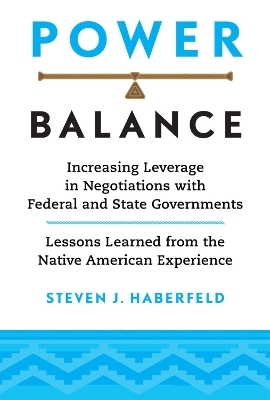
Power Balance
Increasing Leverage in Negotiations with Federal and State Governments—Lessons Learned from the Native American Experience
Seiten
2022
University of Oklahoma Press (Verlag)
978-0-8061-7651-2 (ISBN)
University of Oklahoma Press (Verlag)
978-0-8061-7651-2 (ISBN)
Negotiation is often anything but simple for Native nations engaged with federal, state, and local governments to solve complex issues. Power Balance builds on traditional Native values and peacemaking practices to equip tribes today with additional tools for increasing their negotiating leverage.
Negotiation, understood simply as “working things out by talking things through,” is often anything but simple for Native nations engaged with federal, state, and local governments to solve complex issues, promote economic and community development, and protect and advance their legal and historical rights. Power Balance builds on traditional Native values and peacemaking practices to equip tribes today with additional tools for increasing their negotiating leverage.
As cofounder and executive director of the Indian Dispute Resolution Service, author Steven J. Haberfeld has worked with Native tribes for more than forty years to help resolve internal differences and negotiate complex transactions with governmental, political, and private-sector interests. Drawing on that experience, he combines Native ideas and principles with the strategies of “interest-based negotiation” to develop a framework for overcoming the unique structural challenges of dealing with multilevel government agencies. His book offers detailed instructions for mastering six fundamental steps in the negotiating process, ranging from initial planning and preparation to hammering out a comprehensive, written win-win agreement.
With real-life examples throughout, Power Balance outlines measures tribes can take to maximize their negotiating power—by leveraging their special legal rights and historical status and by employing political organizing strategies to level the playing field in obtaining their rightful benefits. Haberfeld includes a case study of the precedent-setting negotiation between the Timbisha Shoshone Tribe and four federal agencies that resolved disputes over land, water, and other natural resource in Death Valley National Park in California.
Bringing together firsthand experience, traditional Native values, and the most up-to-date legal principles and practices, this how-to book will be an invaluable resource for tribal leaders and lawyers seeking to develop and refine their negotiating skills and strategies.
Negotiation, understood simply as “working things out by talking things through,” is often anything but simple for Native nations engaged with federal, state, and local governments to solve complex issues, promote economic and community development, and protect and advance their legal and historical rights. Power Balance builds on traditional Native values and peacemaking practices to equip tribes today with additional tools for increasing their negotiating leverage.
As cofounder and executive director of the Indian Dispute Resolution Service, author Steven J. Haberfeld has worked with Native tribes for more than forty years to help resolve internal differences and negotiate complex transactions with governmental, political, and private-sector interests. Drawing on that experience, he combines Native ideas and principles with the strategies of “interest-based negotiation” to develop a framework for overcoming the unique structural challenges of dealing with multilevel government agencies. His book offers detailed instructions for mastering six fundamental steps in the negotiating process, ranging from initial planning and preparation to hammering out a comprehensive, written win-win agreement.
With real-life examples throughout, Power Balance outlines measures tribes can take to maximize their negotiating power—by leveraging their special legal rights and historical status and by employing political organizing strategies to level the playing field in obtaining their rightful benefits. Haberfeld includes a case study of the precedent-setting negotiation between the Timbisha Shoshone Tribe and four federal agencies that resolved disputes over land, water, and other natural resource in Death Valley National Park in California.
Bringing together firsthand experience, traditional Native values, and the most up-to-date legal principles and practices, this how-to book will be an invaluable resource for tribal leaders and lawyers seeking to develop and refine their negotiating skills and strategies.
Steven J. Haberfeld is cofounder and former executive director of the Indian Dispute Resolution Service, Inc. He has devoted more than fifty years to working as a community organizer, mediator, negotiator, and trainer in multicultural and multiethnic settings.
| Erscheinungsdatum | 04.02.2022 |
|---|---|
| Verlagsort | Oklahoma |
| Sprache | englisch |
| Maße | 152 x 228 mm |
| Gewicht | 333 g |
| Themenwelt | Recht / Steuern ► Arbeits- / Sozialrecht ► Sozialrecht |
| Recht / Steuern ► EU / Internationales Recht | |
| Recht / Steuern ► Privatrecht / Bürgerliches Recht ► Zivilverfahrensrecht | |
| Sozialwissenschaften ► Ethnologie | |
| Sozialwissenschaften ► Politik / Verwaltung ► Staat / Verwaltung | |
| Sozialwissenschaften ► Soziologie | |
| ISBN-10 | 0-8061-7651-2 / 0806176512 |
| ISBN-13 | 978-0-8061-7651-2 / 9780806176512 |
| Zustand | Neuware |
| Informationen gemäß Produktsicherheitsverordnung (GPSR) | |
| Haben Sie eine Frage zum Produkt? |
Mehr entdecken
aus dem Bereich
aus dem Bereich
Textausgabe mit ausführlichem Sachverzeichnis
Buch | Softcover (2024)
dtv Verlagsgesellschaft
CHF 29,25
meine Rechte: Wohnen, Arbeiten, Steuern, Mobilität
Buch | Softcover (2024)
C.H.Beck (Verlag)
CHF 16,65


